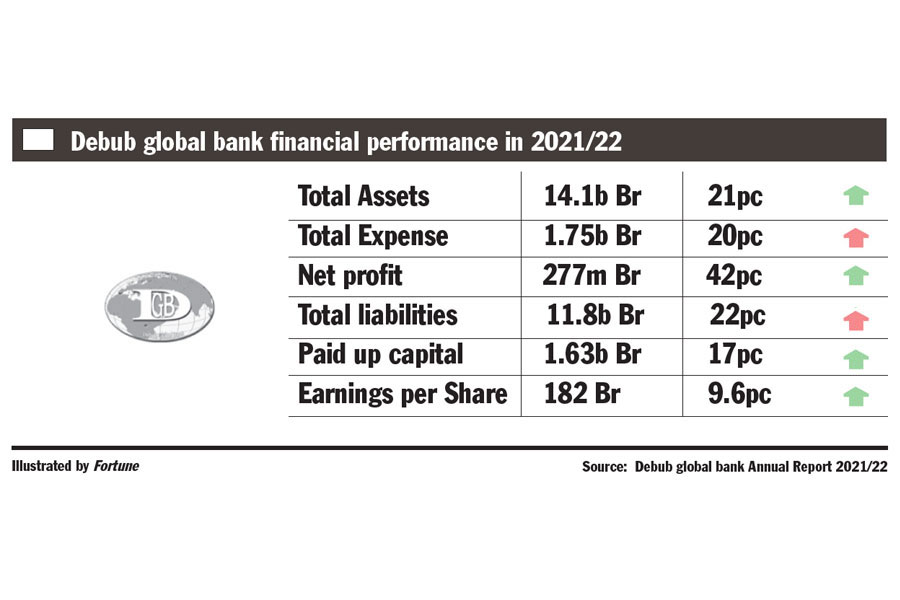
Radar | Jun 11,2022
Apr 30 , 2022
By Yigermal Meshesha
The age of fintech requires flexibility, decentralised decision-making, a bias toward testing and learning, and overall better business practice. All of these are loathsome to the traditional banks in Ethiopia, writes Yigermal Meshesha (yigermalet@gmail.com), a banker with over a decade of experience in the industry.
Almost three decades since the opening up of the financial sector to private players, the banking penetration rate is still weak, and the level of financial literacy, even in urban and semi-urban areas, is pitiable.
There are 21 banks and 39 microfinance institutions operational, with almost 65 million accounts on aggregate. As there is no national identification system, redundancy of accounts by the same people in a single bank and in multiple financial institutions cannot be accurately ascertained. Yet, as high as 35pc of the accounts are estimated to be redundant.
The financial inclusion strategy being overseen by the National Bank of Ethiopia (NBE) contains and recognises the challenges and needs for robust and responsible inclusion platforms. Yet, the level of understanding by stakeholders and implementation replication (not to say failure) without proper customisation and know-how has been a bottleneck.
In most cases, commercial banks defined financial inclusion as customer base expansion through door-to-door recruitment. Busy roads and squares of many towns are considered a spot for booth-based customer acquisition and on-boarding. In rare cases, bank officers even knock on residential houses for recruitment, which has brought resentment against the commercial banks from the public.
The equitability of access to finance is also overlooked while implementing the financial inclusion strategy. The deposit mobilised by commercial banks has continued to grow and reached nearly 1.9 trillion Br as of March 2022. Next to government entities, middle- and lower-income households are the main source of deposit for commercial banks. This argument is supported by the portfolio of saving deposits, which has reached 64pc against the total balance of mobilised deposits by all private banks.
On the allocation side, nationwide, there are not more than 305,000 credit accounts in the credit reference bureau with a total outstanding loan of 1.4 trillion Br. Some 60pc of these originate in Addis Abeba, implying that financing continues to flow from the poor to the rich and business people concentrating in the capital city.
This is mainly because of the lack of innovation, traditional and intricate requirements for commercial banks in providing credit facilities and the poor level of financial literacy among the majority population. Financing is protected for the multimillionaires to prosper, leaving behind the majority of savers in the darkness of poverty.
To address this sorry state of affairs, the national development interest and strategies have been sharpened in light of digitisation and digital transformation.
Digitisation is tough to define because it looks different for every industry. In general terms, it is incorporating digital technology into all business areas. The result is a fundamental change in how businesses function and interact with clients. It is a radical rethinking of how an organisation uses technology with processes and people to change business performance.
In a perfect setting, a country's digital transformation is led by the government in partnership with the private sector. Digital transformation requires tremendous cross-sectoral cooperation within a country to pair rapid application development models with optimisation-focused philosophies.
To cope with global developments and localise the use cases and essential elements to hasten the global digital transformation, the government has introduced the national digital payment strategy for implementation between 2021 and 2024.
To meet aspirations to create a digital Ethiopia by 2025, a digital payment ecosystem is an essential enabler and a critical backbone of the intended transformation. Hence, multiple actors, including traditional banks, MFI's and mobile network operators, are rushing to take advantage of the new paradigm.
Paving the way, the central bank introduced the payment instrument issuer and payment service provider directives back in 2021. It attracted the attention of local and international players in the fintech industry.
Enabling fintech – technology that delivers financial services through software such as online banking, mobile payment apps or even cryptocurrency – has significantly impacted African nations' economies such as Kenya and Nigeria. Accordingly, the initiative taken by the government to embark on a legal framework for the emerging accelerators of the economy, fintech, as handy tools for financial inclusion, digitisation, and economic catalysts is highly commendable.
The traditional banking arena, which we know for its conventional malady for almost three decades, has come a long way without enabling the ecosystem for financial inclusion, literacy, and disruption. In most cases, the conventional approach was either copying strategic documents or opening branches on routes protruding from Addis Abeba. It would be a hasty generalisation to say that they are all flawed as they think digitisation is not a business unto itself but rather a channel.
With the upcoming developments, the definition of accessibility and convenience is no more the same in which conventional business will be superseded and no longer yield as much as it did. As far as the emerging innovations are concerned, demography, sociocultural diversity, and level of financial literacy should be well accounted for before launching a product in Ethiopia.
Globally from data, analytics, APIs, and machine learning, much focus within the financial service environment has been on new ways to reinvent business processes to lower costs, improve quality, or reduce cycle times, which we are also in need of here. Unlike the rest of the world, the level of financial literacy in Ethiopia, access to financial services, and the attitude to digital products are at the heart of the transformation agenda fintech players should consider. This will require redefining mindsets, processes, talent, and capabilities for the digital world to achieve long-term digital transformation for the industry and the nation.
Soon, with the expansion of the mobile network operators, digital onboarding will be a requirement as payments are required to be seamless. Interoperability is also becoming a fashion in the financial service sector as mobile money operators integrate with traditional banks, payment gateway operators, and payment service providers. Simultaneously fintech players are expected to enable and incentivise the network of agents across the nation to be diligent enough, stay liquid and promote the business at the forefront. Self-service systems enabled with AI and machine learning should also be embedded early so that the data quality could fulfil the minimum requirement in the future.
This will boost access to finance with a cheap and handy approach by employing USSD or internet connectivity, creating the opportunity for micro saving, micro insurance, and micro-lending, bridging the equitability gap that we have had to date.
Through innovation, competition will flourish, which will cut prices, enhance quality and boost inclusion.
Fintechs should adopt what the most successful corporations globally recognise as digital transformation. It requires a flexible workflow, a decentralised decision-making process, a bias toward testing and learning, and overall better business practice, all abhorrent to the traditional banks in Ethiopia. Ethiopia is already unlocked and the door is opening up, redefining business strategy, adopting agile technology and investing the human capital are the three critical elements the financial sector is expected to work on, and on an Adhoc basis.
PUBLISHED ON
Apr 30,2022 [ VOL
23 , NO
1148]


Radar | Jun 11,2022

Fortune News | Jul 28,2024

Fortune News | Mar 09,2019

Fortune News | Nov 30,2019

Fortune News | Apr 15,2023

Fortune News | Jul 20,2019

Radar | Jan 16,2021

Fortune News | Jan 05,2019

Fortune News | May 29,2021

Radar | Jun 11,2022

Photo Gallery | 178222 Views | May 06,2019

Photo Gallery | 168428 Views | Apr 26,2019

Photo Gallery | 159203 Views | Oct 06,2021

My Opinion | 137056 Views | Aug 14,2021
Commentaries | Oct 25,2025

Dec 22 , 2024 . By TIZITA SHEWAFERAW
Charged with transforming colossal state-owned enterprises into modern and competitiv...

Aug 18 , 2024 . By AKSAH ITALO
Although predictable Yonas Zerihun's job in the ride-hailing service is not immune to...

Jul 28 , 2024 . By TIZITA SHEWAFERAW
Unhabitual, perhaps too many, Samuel Gebreyohannes, 38, used to occasionally enjoy a couple of beers at breakfast. However, he recently swit...

Jul 13 , 2024 . By AKSAH ITALO
Investors who rely on tractors, trucks, and field vehicles for commuting, transporting commodities, and f...

Oct 25 , 2025
The regulatory machinery is on overdrive. In only two years, no fewer than 35 new pro...

Oct 18 , 2025
The political establishment, notably the ruling party and its top brass, has become p...

Oct 11 , 2025
Ladislas Farago, a roving Associated Press (AP) correspondent, arrived in Ethiopia in...

Oct 4 , 2025
Eyob Tekalegn (PhD) had been in the Governor's chair for only weeks when, on Septembe...

Oct 25 , 2025 . By YITBAREK GETACHEW
Officials of the Addis Abeba's Education Bureau have embarked on an ambitious experim...

Oct 26 , 2025 . By YITBAREK GETACHEW
The federal government is making a landmark shift in its investment incentive regime...

Oct 29 , 2025 . By NAHOM AYELE
The National Bank of Ethiopia (NBE) is preparing to issue a directive that will funda...

Oct 26 , 2025 . By SURAFEL MULUGETA
A community of booksellers shadowing the Ethiopian National Theatre has been jolted b...